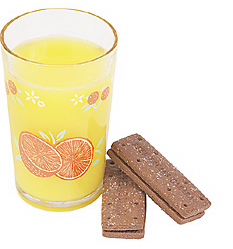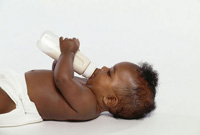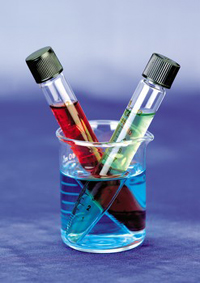Posted on December 6, 2009 by Angeline Duran Piotrowski
 The great savior of germ conscious parents far and wide is the gel based hand sanitizer. Pocket size bottles of it emerge from diaper bags and purses after potentially infectious encounters with playgrounds, before eating in public restaurants, and even discreetly after playdates with friends who have suspiciously runny noses. Applying the astringent makes us feel in control, but are we being effective? The quick and dirty answer is Yes and No. Continue reading →
The great savior of germ conscious parents far and wide is the gel based hand sanitizer. Pocket size bottles of it emerge from diaper bags and purses after potentially infectious encounters with playgrounds, before eating in public restaurants, and even discreetly after playdates with friends who have suspiciously runny noses. Applying the astringent makes us feel in control, but are we being effective? The quick and dirty answer is Yes and No. Continue reading →
Filed under: Health | Tagged: alcohol, bacteria, germs, hand sanitizer | 1 Comment »
Posted on October 22, 2009 by Angeline Duran Piotrowski
 Many parents grew up with medical adages or advice that have since been proven by scientists to be incorrect or outdated. Here are five common myths about children’s eye health and the medical reality behind them, written by the physicians at The Vision Center at Childrens Hospital Los Angeles. Continue reading →
Many parents grew up with medical adages or advice that have since been proven by scientists to be incorrect or outdated. Here are five common myths about children’s eye health and the medical reality behind them, written by the physicians at The Vision Center at Childrens Hospital Los Angeles. Continue reading →
Filed under: Health | Tagged: children, eye, Health, vision | 11 Comments »
Posted on September 10, 2009 by Angeline Duran Piotrowski
 [Written by American Thoracic Society]
[Written by American Thoracic Society]
New research hints that the common belief that kids who go to daycare have lower rates of asthma and allergy later in life might be nothing more than wishful thinking. While young children in daycare definitely do get more illnesses and experience more respiratory symptoms as a result, any perceived protection these exposures afford against asthma and allergy seem to disappear by the time the child hits the age of eight. Continue reading →
Filed under: Health | 5 Comments »
Posted on August 12, 2009 by Angeline Duran Piotrowski
 Once our children outgrow diapers, we all hope that they will enjoy comfortable nights of sleep in a dry bed. Also, more practically, we want them to be able to sleep over at friends’ houses or in a hotel bed without worry that they will soil the bed or suffer embarrassment. But what about the child who, despite diligent night-training, continues to sleep right through the urge to use the bathroom. Is it his fault? Is it ours? Continue reading →
Once our children outgrow diapers, we all hope that they will enjoy comfortable nights of sleep in a dry bed. Also, more practically, we want them to be able to sleep over at friends’ houses or in a hotel bed without worry that they will soil the bed or suffer embarrassment. But what about the child who, despite diligent night-training, continues to sleep right through the urge to use the bathroom. Is it his fault? Is it ours? Continue reading →
Filed under: Child Development, Health | 9 Comments »
Posted on July 30, 2009 by Angeline Duran Piotrowski
No less a revered medical institution than the Mayo Clinic, the saviors of severely medically challenged children nationwide, have studied and declared that anesthetics used during cesarean births do not cause children to have brain problems. Continue reading →
Filed under: Child Development, Health | 6 Comments »
Posted on June 11, 2009 by Angeline Duran Piotrowski
 For years, doctors and scientists have told the public to drink milk, eat dairy products and take calcium supplements to improve bone health and prevent osteoporosis. The problem is they’re wrong. Continue reading →
For years, doctors and scientists have told the public to drink milk, eat dairy products and take calcium supplements to improve bone health and prevent osteoporosis. The problem is they’re wrong. Continue reading →
Filed under: Health, Nutrition | Tagged: Amy Lanou, Calcium, milk, Osteoporosis | 20 Comments »
Posted on June 10, 2009 by Angeline Duran Piotrowski
 Aside from the obvious nutritional benefits of ingesting natural sugars from their source, eating foods created from refined sugar of any kind seems to fall firmly within the jurisdiction of the epithet, “A rose by any other name would smell as sweet.” Continue reading →
Aside from the obvious nutritional benefits of ingesting natural sugars from their source, eating foods created from refined sugar of any kind seems to fall firmly within the jurisdiction of the epithet, “A rose by any other name would smell as sweet.” Continue reading →
Filed under: Health, Nutrition | Tagged: Health, high fructose corn syrup, Nutrition, sugar | 33 Comments »
Posted on March 16, 2009 by Angeline Duran Piotrowski
 “In certain overachieving circles, breast-feeding is no longer a choice — it’s a no-exceptions requirement, the ultimate badge of responsible parenting. Yet the actual health benefits of breast-feeding are surprisingly thin, far thinner than most popular literature indicates. Is breast-feeding right for every family? Or is it this generation’s vacuum cleaner – an instrument of misery that mostly just keeps women down?” Excerpt from the new article “The Case Against Breast-Feeding” appearing in the April issue of The Atlantic written by Hanna Rosin. Continue reading →
“In certain overachieving circles, breast-feeding is no longer a choice — it’s a no-exceptions requirement, the ultimate badge of responsible parenting. Yet the actual health benefits of breast-feeding are surprisingly thin, far thinner than most popular literature indicates. Is breast-feeding right for every family? Or is it this generation’s vacuum cleaner – an instrument of misery that mostly just keeps women down?” Excerpt from the new article “The Case Against Breast-Feeding” appearing in the April issue of The Atlantic written by Hanna Rosin. Continue reading →
Filed under: Health, Nutrition | Tagged: breast, breastfeeding, milk | 49 Comments »
Posted on January 26, 2009 by Angeline Duran Piotrowski
 According to David Barker, M.D., Ph.D., professor of clinical epidemiology at the University of Southampton, UK and professor of Cardiovascular in the Department of Medicine at the Oregon Health and Science University and one of the authors of the report, “A longer period of breastfeeding was associated with lower BMI (a measure for weight) at one year of age. This relationship disappeared by the age of 7 years.” Similarly, there was no significant difference in BMI at the age of 60 years associated with duration of breastfeeding.
According to David Barker, M.D., Ph.D., professor of clinical epidemiology at the University of Southampton, UK and professor of Cardiovascular in the Department of Medicine at the Oregon Health and Science University and one of the authors of the report, “A longer period of breastfeeding was associated with lower BMI (a measure for weight) at one year of age. This relationship disappeared by the age of 7 years.” Similarly, there was no significant difference in BMI at the age of 60 years associated with duration of breastfeeding.
These findings may help explain why some studies that examined breastfed infants during the first year of life suggested a protective effect of breastfeeding and obesity, whereas other studies that examined the relationship later in life have found no such effect. Continue reading →
Filed under: Child Development, Health, Nutrition | 6 Comments »
Posted on January 26, 2009 by Angeline Duran Piotrowski

A new study by researchers at NYU Langone Medical Center found a high desire for additional genetic testing among consumers for life altering and threatening medical conditions including mental retardation, blindness, deafness, cancer, heart disease, dwarfism and shortened lifespan from death by 5 years of age. Consumers, however, are less interested in prenatal genetic testing for traits including tall stature, superior athletic ability and superior intelligence. Continue reading →
Filed under: Health | Tagged: BABIES, BLINDNESS, cancer, CONSUMERS, COUNSELING, DEAFNESS, DEATH, DESIGNER, DISEASE, DWARFISM, ENHANCEMENTS, GENES, GENETIC, HEART, HUMAN, INTELLIGENCE, LIFE, LIFESPAN, MENTAL RETARDATION, PRENATAL, REPRODUCTIVE, RISK, STATURE, SURVEY, testing, TRAITS | 1 Comment »
 The great savior of germ conscious parents far and wide is the gel based hand sanitizer. Pocket size bottles of it emerge from diaper bags and purses after potentially infectious encounters with playgrounds, before eating in public restaurants, and even discreetly after playdates with friends who have suspiciously runny noses. Applying the astringent makes us feel in control, but are we being effective? The quick and dirty answer is Yes and No. Continue reading
The great savior of germ conscious parents far and wide is the gel based hand sanitizer. Pocket size bottles of it emerge from diaper bags and purses after potentially infectious encounters with playgrounds, before eating in public restaurants, and even discreetly after playdates with friends who have suspiciously runny noses. Applying the astringent makes us feel in control, but are we being effective? The quick and dirty answer is Yes and No. Continue reading 

 Stumble This Website!
Stumble This Website!
 Many parents grew up with medical adages or advice that have since been proven by scientists to be incorrect or outdated. Here are five common myths about children’s eye health and the medical reality behind them, written by the physicians at The Vision Center at Childrens Hospital Los Angeles.
Many parents grew up with medical adages or advice that have since been proven by scientists to be incorrect or outdated. Here are five common myths about children’s eye health and the medical reality behind them, written by the physicians at The Vision Center at Childrens Hospital Los Angeles.  [Written by
[Written by  Once our children outgrow diapers, we all hope that they will enjoy comfortable nights of sleep in a dry bed. Also, more practically, we want them to be able to sleep over at friends’ houses or in a hotel bed without worry that they will soil the bed or suffer embarrassment. But what about the child who, despite diligent night-training, continues to sleep right through the urge to use the bathroom. Is it his fault? Is it ours?
Once our children outgrow diapers, we all hope that they will enjoy comfortable nights of sleep in a dry bed. Also, more practically, we want them to be able to sleep over at friends’ houses or in a hotel bed without worry that they will soil the bed or suffer embarrassment. But what about the child who, despite diligent night-training, continues to sleep right through the urge to use the bathroom. Is it his fault? Is it ours? 
 For years, doctors and scientists have told the public to drink milk, eat dairy products and take calcium supplements to improve bone health and prevent osteoporosis. The problem is they’re wrong.
For years, doctors and scientists have told the public to drink milk, eat dairy products and take calcium supplements to improve bone health and prevent osteoporosis. The problem is they’re wrong.  Aside from the obvious nutritional benefits of ingesting natural sugars from their source, eating foods created from refined sugar of any kind seems to fall firmly within the jurisdiction of the epithet, “A rose by any other name would smell as sweet.”
Aside from the obvious nutritional benefits of ingesting natural sugars from their source, eating foods created from refined sugar of any kind seems to fall firmly within the jurisdiction of the epithet, “A rose by any other name would smell as sweet.”  “In certain overachieving circles, breast-feeding is no longer a choice — it’s a no-exceptions requirement, the ultimate badge of responsible parenting. Yet the actual health benefits of breast-feeding are surprisingly thin, far thinner than most popular literature indicates. Is breast-feeding right for every family? Or is it this generation’s vacuum cleaner – an instrument of misery that mostly just keeps women down?” Excerpt from the new article “
“In certain overachieving circles, breast-feeding is no longer a choice — it’s a no-exceptions requirement, the ultimate badge of responsible parenting. Yet the actual health benefits of breast-feeding are surprisingly thin, far thinner than most popular literature indicates. Is breast-feeding right for every family? Or is it this generation’s vacuum cleaner – an instrument of misery that mostly just keeps women down?” Excerpt from the new article “ According to David Barker, M.D., Ph.D., professor of clinical epidemiology at the University of Southampton, UK and professor of Cardiovascular in the Department of Medicine at the Oregon Health and Science University and one of the authors of the report, “A longer period of breastfeeding was associated with lower BMI (a measure for weight) at one year of age. This relationship disappeared by the age of 7 years.” Similarly, there was no significant difference in BMI at the age of 60 years associated with duration of breastfeeding.
According to David Barker, M.D., Ph.D., professor of clinical epidemiology at the University of Southampton, UK and professor of Cardiovascular in the Department of Medicine at the Oregon Health and Science University and one of the authors of the report, “A longer period of breastfeeding was associated with lower BMI (a measure for weight) at one year of age. This relationship disappeared by the age of 7 years.” Similarly, there was no significant difference in BMI at the age of 60 years associated with duration of breastfeeding.



